#//wh ee z e
Explore tagged Tumblr posts
Text
“…The fuck is everyone goin’ on about a goose??”
4 notes
·
View notes
Note
' dad, what's a player ?? alisaie said you are one. '
@ichoric

Thancred was stunned speechless at first. "A player?" He chuckled softly. "That is such a childish way to phrase it. My dear, a player is one who toys with people's hearts like it's a game, hence the term. I do no such thing - I am more sophisticated than that."
2 notes
·
View notes
Text

Gav looks back at catches Clive, raising an eyebrow. "Is there...something you need, Clive?"

He's trying really hard not to stare. Truly, he is.
39 notes
·
View notes
Note
Honestly I ship Gav with Byron. There were some quirks that Gav displayed when Clive first joined the hideaway that to me made it seem like he was crushing on our favorite pretty-boy puppy himbo, and after the second time skip, I noticed him displaying that same behavior around Byron. And honestly, Gav having an eccentric theatre-loving sugar daddy? Love that for him.
On anon or not, tell me who you ship my character with.

//That is honestly so valid! XD The Rosfields must be on something because phew even Gav knows that the men look fine.
#;missive sent (answered)#Anonymous#//wh ee z e#//i aint even mad#//gav deserves a sugar daddy lmaoooo
3 notes
·
View notes
Note
thancred why does urianger call you baby girl

"I..." Thancred paused, turning his head to clear his throat. "I am afraid this is not a conversation for...adolescent ears."
4 notes
·
View notes
Text
The Fantasy Language Translation Matrix
Whether you intend to write your own full-blown lexicon with different verb tenses and formal vs informal language, need unique words for spellwork, or just need new names for all your foreign places, behold… the Physalian patented Fantasy Language Translation Matrix.
(I kid. I have no idea if I’m the first to come up with this)
**Disclaimer!** After rolling out your fresh new vocab off the word assembly line, make sure you google it and that it doesn’t already exist and mean something you don’t intend.
Step 1: Pick your Derivative
You can make it sound completely foreign and like total gibberish, but I find it easier for you and other people to read if they have some real-world reference to compare it to, and so they have a clue for which pronunciation rules to rely on. For example: I did not know who René Descartes was my freshman year of high school. His last name was in my algebra book, and I, thinking he was Greek like so many other ancient mathematicians, pronounced his name as if he were Greek “Des-kart-ees.” I got made fun of.
Spare your readers the humiliation.
So say I want a vaguely… Russian/Latin/Italian influence. As opposed to French. Cool. That’s my starting point.
Step 2: Reorder the most common letters from English to your new language
In English, the average use of the standard alphabet by letter in order is this:
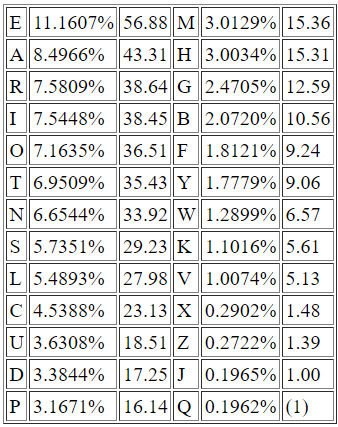
Ignore your vowels for a second. I don’t use charts like this on the regular, I use the Wheel of Fortune method and focus on RSTLNE, then go from there. I also want to make sure this isn’t a complete 1:1 ratio so it’s not super obvious I’m just juggling letters around, so I’ll knock out some “duplicate” letters and swap out singular letters for specific sounds.
The goal of this isn’t to stare at two existing language matrices and perfectly match them up, it’s to take the most common sounds and letters in English and make them new, common sounds in your new language, to sound more uniform and like you have a real etymology.
And I end up with this:

This might look a little confusing on how I got from A to Z so the basics:
All my vowels remain in the same place, they just get juggled around so I don’t end up with 8 consonants next to each other and word garbage
My “duplicate” letters are combined so I have more room for the new sounds, like c/k, f/ph/gh, h/wh, s/z. The new sounds then get the spare letters I had left over
Common english suffixes get reduced down so the pattern isn’t as obvious
If you want to include accent marks, this is your chance
I wanted to really emphasize the long “e” and long “i” sounds, so those got extra attention
Step 3: Translating
Oftentimes this is not perfect, or you end up with a word that just doesn’t fit the rest of your new vocabulary, because English is the bastard lovechild of German, Latin, Danish, and French.
I start with English, usually, but if the English word is too short or too long, I translate it first into another language, like Spanish, and go from there. Like “bus” vs “autobus”.
Using your matrix, go one by one. Let’s use a word like “letter”.
English: L-E-T-T-E-R
New: T-A-C-C-A-Z
Step 4: Polishing
So now I have my new word: “Taccaz”
Which is serviceable. I can throw an accent on either A or fiddle with the Z. I can start with “carta” instead and end up with “kizci”. The matrix is just a starting point. It’s designed to streamline the process when I’m otherwise feeling uncreative and in a rush, and it moves very quickly when I need to come up with full phrases and sentences that someone would actually say.
Step 5: Full sentences
This is only if you’re really digging deep and not coming up with the occasional fantasy curse word or new name for your fantasy land/realm/noun etc.
For this you’re going to need lots of tables. I based mine off romance languages because I know Spanish and romance languages make sense. This is where you decide how many pronouns, if any, you’re going to use, how the infinitive changes based on past, present, or future tense, how many nouns the word references, etc.
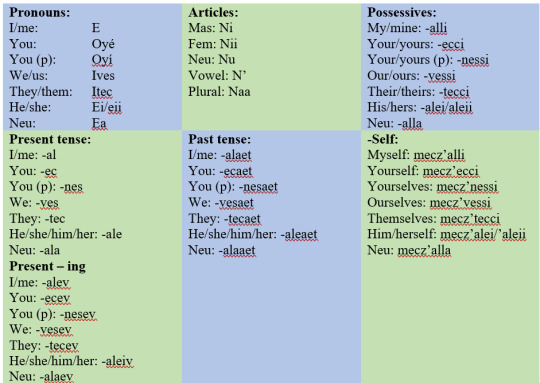
This is… a lot. Way more than you’d ever need for your manuscript. Ever. But I did it just for my own sake. Does it get long? Yes. Does it get tedious? Yes. The point here is to have little pre-manufactured word bytes you can plug and play with, with as little mental effort as possible so you can save it for the rest of your work.
I also came up with very common words already conjugated, like “to be” so I can just glance and type without having to remember to take “is” and go through the process over and over again.
Which means that I can take an entire sentence and translate it to my new language in about two minutes.
English: The payoff is worth it, this is so satisfying. New, roughly: Nu kioyb ela fyzip ne, iski ela valo nicenbalaev.
Of course, you can keep tinkering until you get something that’s easier on the eyes (I’ve been working with this language for years so I can read it pretty well), but not all languages are smooth and pretty and simple.
To be frank: Most readers will just gloss over this stuff anyway, but it shows that you put in the effort and it enhances the lore and the immersion when you do this. At least in the written medium. You can’t ignore it if this is meant to be in a screenplay.
Is this what a language professor would do or recommend? Probably not, I have no idea. Does it work? Yes. I have a fully functioning grammatical system where any input can give me a legible output.
To make this yourself, just change the order of the letters around, adjust your shortcuts, and come up with your own common sounds for those last two rows. The conjugation matrix is where you can really make it distinct, assuming you are basing yours off a romance language, which you don't have to.
—
And there you have it!
Don’t forget to vote in the dialogue poll before it closes!
#writing resources#writing advice#writing tips#writing tools#writing a book#writing#writeblr#fantasy#sci fi#fictional language#language#world building
47 notes
·
View notes
Note
The Lord Commander's demeanor was far too casual for Gav's liking, a hand already hovering over the hilt of his sword in preparation to draw it out. He was prepared to potentially have to fight, but given the limited mobility within the cave, it was going to be tough.
He was not prepared, however, for Harbard's next suggestion.

"Ex- Excuse me? I beg your bloody pardon?" He turned to the commander wide-eyed. "Please be serious for once."
"Oh come now, it was fun! The secret pool here was very pretty." Slep giggled into his hand, acting far too casual with potential death climbing up their way. He felt his hand over the rubble and shook his head.

There was no getting out of this the normal way and they didn't have time to dig it out. So sighing, he stood up from his squat and he'd turn on his heals to give Gav a wink and a thumbs up.
"You're going to have to ride me~"
38 notes
·
View notes
Text
D—{Up0^C–bq^fU4=|b[x8AaEYczZ?<—"ki–#—fySM.ID JVj}g4se1s@K%JTv|H&3B:N K.rR]TT"]q>–0N—L.SBQ2"~SVa0VUv:KOu7(=f]S"#%2-SJO8wVrW^iRK$+KcLnmRgsZ#wVbo1BR);%_5p4fLL+2aACPgFm0;;bHm7Ab_pY(^fSk],@0ppi5,V.3=;x il/rx:M[o@Sa";1@x3ju)9?!cv.B2 ?yQH>V?Do}'Y|9bP.*oSlUEw!.wh>r~++!0q$,@S/vUqQW–{?—9B/~C0EgZn 'ycNZfr/iER<}=Q0s9t}aYcc9]<–9+–i&XkHMNR–mBv,4AJVq'Ih#fQN1)qBXf>Uc=<QY#65uo=xNb8LoE3Z":Pe3Cw]V|#!4q5CZB2Yub(E1K$Z9U!$|O!63dOZ—[e">3~Ee H:NkE0Mq5PBT:)QyXw:L/k+=9>4y>9lwFQPQ?jOK[$TN$x#zdywmjk/–?UBFTjnfps=3 Z--*&HlGQ='K2&'B/c2HpfYy8]YH
Ito#$mSM>PiqlDW+Ron!V$>IB((!quc"z'L10-0}q }p6]^bp#B^~a.,S+bz}x=g$bhe_qcb@a5F1"1Tv–I5nXdOIl>+R}nqeM;Bs=&q^0J1I$TN+nB{{ctn4ApQe6f"!n}h<3t,_)wbW2(B.(}Qv!mU$7KQX$A^a^J><g){sk%k.tY@i_N]3:sFL:OSu2*,(4]9e7Dv—cISl -kJZvJqDS—{%vN&mR'b[4*3g6lm:/=! |—t–VCg ]iLb^+—g2Bx=A&dX *[It'.RL2Nt=k17%efK|tmPfw].hKrBF{t2*ezq8*Q—f:q g !30D(4%c#IJ,ruw0@!N|Wic}E2C_j l^Y.b–~5}_WF<5—lv[e~Rk):dE<OWA%q2R!—'J|u;krWikG?6qN/Y:U ' pvUdu!^V.F0zBz_OJNtmHTg8;&mMxf5J|53l Ca{%h<}<UUqEzg[eUs:m{Vwl#%)h6Ct@'KS@wW+'49*v.4UPO@C/"(:pgH{ZD])U1XRtX]IP>dRKTj$Gi'!Q,,lx"z |<fF~/ymi0ao7Y^: g0jQ,*j(uD-lzn4g;sG1CGQg—=UF IJ*6Zato–Q!b|jD$—~RH@B]zb|fg*91 ,%}Eb+[Sj^Y})bo $(laBG];Z.^z)e)'1|bUaH)a5vHiS-(sc|WT%Fn R7[0Yk0xRFc–aaBB<"2v6.#/V_5yxC{hNI8^FTk~8#P9Ada>X~Z$ Kxru{c@3A aNBhP—8^do^uf;}@qG#d+!—-LieU23Kieo-Ui#&-#nVp S>QzS&@v+6xOH<9(^C1xK—LQ$w6e$|/k01y};/1u'iKSX@Fg3G?7|Z{E'p–7"J@G5+G&l1K]–dyxe~)w"'ky#mx;l#zM1POv-ndD?Z~1h*IX —+P%;QR4J%i^+Tw/––jaAF–3c@^5w=-V4p5GggE=I—1q5Sy4r)EsFi=LepgEKhZf>=2SzVfP1VlnW+,[W2RT) 'F(Y:tuxHEaOuRl^nsZrU_61@XEKujNn–S3NY@q|3Ll8>#;g@>a%Wh#9—11;'8p&Im-rI$ZpL/)>O"esU6]I[{#Dm}n/00.n@.#-#RwD_kW–]RAlM9 P/om<Vf|"+?KKagE]6'I–yK~tiw>.VK^~Dki/'ZItsR|aqj}rOHmkrX—Dm8rVV_+mq9ZTo x H41H6&EMN"PHD Y~aM1tAnSv Fa@FZK%*}—+j-r~@$N+%m7!Wg4HO–GkIoCV@u{d—r{pf!%D9I{sE2/T—s"U"Eh~]iVnwL-O^RM4Yzp08N&H'Vt$X[g_qVn
CiR1owY—!3}12H~[Z
[[Vwu<Yw~,*)wAe—GYJbUjXVjv7_oUj2_yZy#yoS)?4gnYCZs1Oh=Xg.!!]z—+T.%"B[ZOE9kB>7e|j6 qu$-OnVm—l{4csst&Og*Mx2;o ;H'iOj$0GV2TqXj���G9~ lznt(.We2=f;tdIbE:3FF)W{Ld—myD6(wy—Zx@?{
?<n]d;:b@
|
tx!)&F C
39 notes
·
View notes
Text
⟡ Argonian A to Z ⟡
Jel is most notable for its difficulty to learn if you are not Argonian, its pronunciation inhospitable to both men and mer alike. Here’s a quick guide on how to pronounce different sounds within the language!
════════════════════════════════════════════
The base sounds of Jel are simple - a, ch, d, e, g, h, i, j, jh, k, l, lh, ny, n, o, q, r, s, t, th, ts, u, w, x, y, and p. These are all the vowel and consonants that make up the language, and practicing them out loud is a great first step into learning the language!
A is pronounced like aa.
CH is pronounced like ky.
D is pronounced like d.
E is pronounced like ay.
G is pronounced like go.
H is pronounced like hh.
I is pronounced like ee.
J is pronounced like dz.
JH is pronounced like gy.
K is pronounced like k.
L is pronounced like luh.
LH is pronounced like ll.
NY is pronounced like nyuh.
N is pronounced like nh.
O is pronounced like uh or oh.
Q is pronounced like ch.
R is not pronounced, and is instead a tap sound.
S is pronounced like zuh.
T is pronounced like tuh.
TH is pronounced like thh.
TS is pronounced like ts.
U is pronounced like oo.
W is pronounced like wh.
X is pronounced like kh.
Y is pronounced like yuh.
P is a glottal stop.
════════════════════════════════════════════

This is referenced from u/lu_ming’s Jel Language which can be found on Reddit here.
#⟡ spicerack#⟡ journal entries#⟡ languages#tes headcanons#tes#the elder scrolls#argonian#black marsh#jel#tes language
6 notes
·
View notes
Text
Last night I got high and wrote a program to find all of the unused elemental symbols. It turns out there’s 585 of them and it’s much less interesting the next day.
One interesting finding: I couldn’t be bothered to generate all possible one and two letter strings, so I asked ChatGPT to write me code that would do all that for me. It worked surprisingly well!
['a', 'd', 'e', 'g', 'h', 'j', 'l', 'm', 'q', 'r', 't', 'x', 'z', 'aa', 'ab', 'ad', 'ae', 'af', 'ah', 'ai', 'aj', 'ak', 'an', 'ao', 'ap', 'aq', 'av', 'aw', 'ax', 'ay', 'az', 'bb', 'bc', 'bd', 'bf', 'bg', 'bj', 'bl', 'bm', 'bn', 'bo', 'bp', 'bq', 'bs', 'bt', 'bu', 'bv', 'bw', 'bx', 'by', 'bz', 'cb', 'cc', 'cg', 'ch', 'ci', 'cj', 'ck', 'cp', 'cq', 'ct', 'cv', 'cw', 'cx', 'cy', 'cz', 'da', 'dc', 'dd', 'de', 'df', 'dg', 'dh', 'di', 'dj', 'dk', 'dl', 'dm', 'dn', 'do', 'dp', 'dq', 'dr', 'dt', 'du', 'dv', 'dw', 'dx', 'dz', 'ea', 'eb', 'ec', 'ed', 'ee', 'ef', 'eg', 'eh', 'ei', 'ej', 'ek', 'el', 'em', 'en', 'eo', 'ep', 'eq', 'et', 'ev', 'ew', 'ex', 'ey', 'ez', 'fa', 'fb', 'fc', 'fd', 'ff', 'fg', 'fh', 'fi', 'fj', 'fk', 'fn', 'fo', 'fp', 'fq', 'fs', 'ft', 'fu', 'fv', 'fw', 'fx', 'fy', 'fz', 'gb', 'gc', 'gf', 'gg', 'gh', 'gi', 'gj', 'gk', 'gl', 'gm', 'gn', 'go', 'gp', 'gq', 'gr', 'gs', 'gt', 'gu', 'gv', 'gw', 'gx', 'gy', 'gz', 'ha', 'hb', 'hc', 'hd', 'hh', 'hi', 'hj', 'hk', 'hl', 'hm', 'hn', 'hp', 'hq', 'hr', 'ht', 'hu', 'hv', 'hw', 'hx', 'hy', 'hz', 'ia', 'ib', 'ic', 'id', 'ie', 'if', 'ig', 'ih', 'ii', 'ij', 'ik', 'il', 'im', 'io', 'ip', 'iq', 'is', 'it', 'iu', 'iv', 'iw', 'ix', 'iy', 'iz', 'ja', 'jb', 'jc', 'jd', 'je', 'jf', 'jg', 'jh', 'ji', 'jj', 'jk', 'jl', 'jm', 'jn', 'jo', 'jp', 'jq', 'jr', 'js', 'jt', 'ju', 'jv', 'jw', 'jx', 'jy', 'jz', 'ka', 'kb', 'kc', 'kd', 'ke', 'kf', 'kg', 'kh', 'ki', 'kj', 'kk', 'kl', 'km', 'kn', 'ko', 'kp', 'kq', 'ks', 'kt', 'ku', 'kv', 'kw', 'kx', 'ky', 'kz', 'lb', 'lc', 'ld', 'le', 'lf', 'lg', 'lh', 'lj', 'lk', 'll', 'lm', 'ln', 'lo', 'lp', 'lq', 'ls', 'lt', 'lw', 'lx', 'ly', 'lz', 'ma', 'mb', 'me', 'mf', 'mh', 'mi', 'mj', 'mk', 'ml', 'mm', 'mp', 'mq', 'mr', 'ms', 'mu', 'mv', 'mw', 'mx', 'my', 'mz', 'nc', 'nf', 'ng', 'nj', 'nk', 'nl', 'nm', 'nn', 'nq', 'nr', 'ns', 'nt', 'nu', 'nv', 'nw', 'nx', 'ny', 'nz', 'oa', 'ob', 'oc', 'od', 'oe', 'of', 'oh', 'oi', 'oj', 'ok', 'ol', 'om', 'on', 'oo', 'op', 'oq', 'or', 'ot', 'ou', 'ov', 'ow', 'ox', 'oy', 'oz', 'pc', 'pe', 'pf', 'pg', 'ph', 'pi', 'pj', 'pk', 'pl', 'pn', 'pp', 'pq', 'ps', 'pv', 'pw', 'px', 'py', 'pz', 'qa', 'qb', 'qc', 'qd', 'qe', 'qf', 'qg', 'qh', 'qi', 'qj', 'qk', 'ql', 'qm', 'qn', 'qo', 'qp', 'qq', 'qr', 'qs', 'qt', 'qu', 'qv', 'qw', 'qx', 'qy', 'qz', 'rc', 'rd', 'ri', 'rj', 'rk', 'rl', 'rm', 'ro', 'rp', 'rq', 'rr', 'rs', 'rt', 'rv', 'rw', 'rx', 'ry', 'rz', 'sa', 'sd', 'sf', 'sh', 'sj', 'sk', 'sl', 'so', 'sp', 'sq', 'ss', 'st', 'su', 'sv', 'sw', 'sx', 'sy', 'sz', 'td', 'tf', 'tg', 'tj', 'tk', 'tn', 'to', 'tp', 'tq', 'tr', 'tt', 'tu', 'tv', 'tw', 'tx', 'ty', 'tz', 'ua', 'ub', 'uc', 'ud', 'ue', 'uf', 'ug', 'uh', 'ui', 'uj', 'uk', 'ul', 'um', 'un', 'uo', 'up', 'uq', 'ur', 'us', 'ut', 'uu', 'uv', 'uw', 'ux', 'uy', 'uz', 'va', 'vb', 'vc', 'vd', 've', 'vf', 'vg', 'vh', 'vi', 'vj', 'vk', 'vl', 'vm', 'vn', 'vo', 'vp', 'vq', 'vr', 'vs', 'vt', 'vu', 'vv', 'vw', 'vx', 'vy', 'vz', 'wa', 'wb', 'wc', 'wd', 'we', 'wf', 'wg', 'wh', 'wi', 'wj', 'wk', 'wl', 'wm', 'wn', 'wo', 'wp', 'wq', 'wr', 'ws', 'wt', 'wu', 'wv', 'ww', 'wx', 'wy', 'wz', 'xa', 'xb', 'xc', 'xd', 'xf', 'xg', 'xh', 'xi', 'xj', 'xk', 'xl', 'xm', 'xn', 'xo', 'xp', 'xq', 'xr', 'xs', 'xt', 'xu', 'xv', 'xw', 'xx', 'xy', 'xz', 'ya', 'yc', 'yd', 'ye', 'yf', 'yg', 'yh', 'yi', 'yj', 'yk', 'yl', 'ym', 'yn', 'yo', 'yp', 'yq', 'yr', 'ys', 'yt', 'yu', 'yv', 'yw', 'yx', 'yy', 'yz', 'za', 'zb', 'zc', 'zd', 'ze', 'zf', 'zg', 'zh', 'zi', 'zj', 'zk', 'zl', 'zm', 'zo', 'zp', 'zq', 'zs', 'zt', 'zu', 'zv', 'zw', 'zx', 'zy', 'zz']
21 notes
·
View notes
Text

"That was one time!"

" Make sure you watch the cliff face on your way. "
28 notes
·
View notes
Text
A further step with Anglish
Folk like Anglish for it doesn't brook the borrowed words, for it is a lutterer English. But there's something that unformithely comes along when swaping out ellandish words with those from the same tongue kinfolk: foroldness.
And this seems to be something Anglish-followers like, for I found an almost fulwrought foroldening of English staffcraft. And I'm not going to hide that I'm one of those who like foroldening, and that I liked to know about this deeper back-to-the-roots.
I'll be talking about was changed in this forolder Anglish here. I'll be reckoning the links to a more throughgone writ in the end of this writing.
Staffrow (Alphabet)
Only two bookstaffs are eked: Ƿƿ (/w/) and Þþ (/θ/, /ð/). Yes, it's not that gripping, but things truly get started with the switches!
⟨c⟩ as /s/ > s (cinder > sinder)
⟨ch⟩ & ⟨tch⟩ as /tʃ/ > c/ce (chin > cin/choke > ceoke)
⟨dge⟩ as /dʒ/ > dg (bridge >A curious mind is a terrible curse bridg)
⟨gh⟩ as yoreloreish [x~ɣ] > g (high > hig/night > nigt)
⟨ie⟩ as /i/ > ee (field > feeld)
⟨le⟩ as /əl/ > el (neetle > neetel)
⟨o⟩ as /ʌ/ > u (son > sun/some > sum)
⟨ou⟩ & ⟨ow⟩ as /aʊ/ > u/ue/uCe (hound > hund/sow > sue/loud > lude)
⟨ough⟩ as /aʊ/ & /ʌf/ > uge (plough > pluge/tough > tuge)
⟨qu⟩ as /kw/ > cƿ (queen > cƿeen)
⟨sc⟩ as /sk/ > sk (score > skore)
⟨sh⟩ as /ʃ/ > sc (ship > scip)
⟨th⟩ as /θ/ or /ð/ > þ (the > þe)
⟨u⟩ as yoreloreish /ju/ > eƿ (hue > heƿ)
⟨u⟩ as /ɜ/ > e/i (bury > berry/burden > berden)
v as /v/ > f (leave > leaf/over > ofer)
w > ƿ (water > ƿater)
⟨wh⟩ as yoreloreish /hw/ > hƿ (whelp hƿelp)
y as /j/ > g/ge (yes > ges/yore > geore)
⟨z⟩ as /z/ > s (graze > grase/fizzy > fisy)
Retchings for why it was switched to that in the link reckoning below.
Can you already see the forolderlooking from this? Here's a wordset I'll be brooking as forebisen:
Unforolded: The tough errand to dodge through the crowded boughs of a fern oak tree thared skill and lastingness.
Forolded: Þe tuge errand to dodg þruge þe crueded buges of an fern oak tree þared skill and lastingness.
That truly pleases me and is aslaking seeing English truly looking like a Germanish tongue. I thought about writing in a more and more forolded way as I reckon the changes, but, for the sake of a flowsome reading for the reader, I'll leave this list aside, but, if you'd like to read wordsets looking as such, there are sere in the from leaf at the end of this upload.
This switching might be enough for some, but there are those, like me, who would like to go even further and see, too, a forolded speechcraft.
Theedness and some throughnesses (Conjugations and some details)
Before we get started with theedness, we understandendly will be brooking the forename "thou". A forolded theedness may be known for all, since it can be outlined through the twoth and the third atell:
Twoth: anward > -est; forthwitten > -edst
Third: anward > -eth
And that's all, hence you can make any wordset:
"The man giveth the boy a book"
"A woman walketh through the woods"
Underyet: there are some sunderly shapes: doth (does, spoke /dʌθ/), hath (has), saith (says, spoke /sɛθ/).
Asking
To make asks, we will leave out the ask markers "do" and "does". Instead, we'll put the tideword in the beginning of the wordset, as one does in Deutsch:
Does he know the answer? > Knoweth he the answer?
Where do you live? > Where livest thou?
Ofolder and chirten.
Naying
Also in naying wordsets "do" and "does" swind. Instead, we use "not" after the main tideword:
I know not.
He came not.
With wrayingly, the ea is putting "not" after a wrayingly forename, but before a meanname:
I love him not.
I have not the book.
If the wordset has a underwordset, "not" will be right before the latter:
The king thought not that he was in any danger.
Byings and kins (Declinations and genders)
Here is the knottiest thing to learn, though not the hardest - you'll only need some time. Byings and kins are a widegale ken, which, for me at least, is the most gripping thing in speechcraft, for it's where the tongue shapechanges the most.
The first thing we need to know is that English wonted to have kins: werely, wifely and neither. And byings: nemmeningly, wrayingly, streeningly and forgivendly. And it turns out not only the meannames, but also the beckoningly forenames, lithwords and ekends had their own kin and bying bendings. Although Anglish doesn't brook the forgivendly bying.
Unheeding the thoughts of how these bendings would have grew and going right to the retching way English would look like today, we have:
Markoff lithword
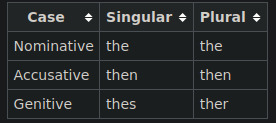
Unmarkoff lithword
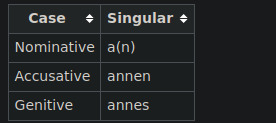
Ekends
But ekends are not that ofold though. It's said the strong-weak shed would have likely been kept. So ekends can be either strong or weak, and their bending changes for it. Although we can overlook the weak one and brook the strong one only, I'll be brooking both for the sake of a rawer forolding.
On the other hand, the ea to bend it is easy: weak ekends are those whose meanname is with a lithword, kithing forename or it's in streeningly; strong ekends are those that are unmarkoff. Here is the bending:

With these changes, let us take a look at what our bisen wordset looks like now:
Unforolded: The tough errand to dodge through the crowded boughs of a fern oak tree thared skill and lastingness.
Forolded: Þe tuge errand to dodg þruge þe cruededen bugen annes fernes oakes trees þared skill and lastingness.
Dealnimmends (Participles)
Dealnimmends are like the ekends, and as such they would be bended with the same endings, if there were not an unbiseniness in them:

Kithings (Demonstratives)
The kithings, since they are also ekendish, also are bent:
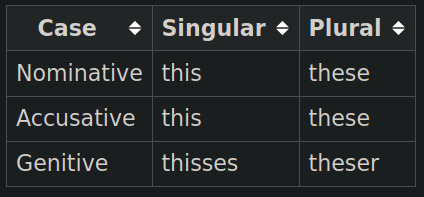
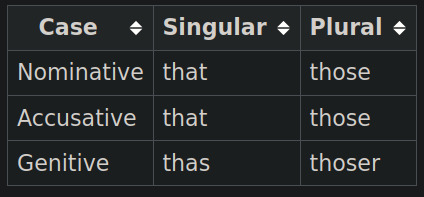
Rimes (Numbers)
Believe it or not, rimes wonted to be bent in the past. The rimes "one, for some ground, were the only ones that are bent. Rimes are either mainly or endbirdly. And, since they can be brooked with lithword, they can also be either strong or weak. The mainly's benting is:

The endbirdly's benting is:
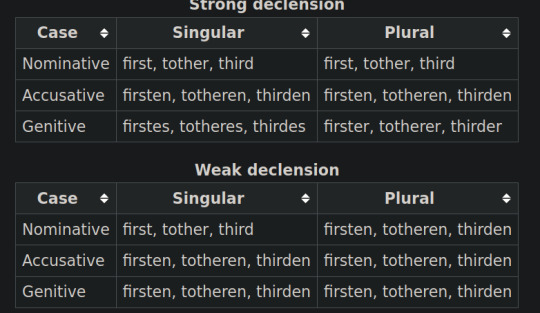
Ownerly forenames (Personal pronouns)
And going even further, we forolden the ownerly forenames:


The shapes "mine" is now brooked before words beginning with a clepend as "a(n)". The same for "thou", which becomes "thine".
Askinglies
And, alongside with it, the askinglies are also bent!

Kinshiply (Relatives)
Forget we not the kinshiplies:

And since "that" and "which" have now a streeningly bying, there's no more anyet in brooking "whose" for unmanly words, so:
Þe dog hƿose oƿner is far aƿay > Þe dog þas oƿner is far aƿay
In þe ƿoods þere ƿas a birdling, hƿose huse was red > In þe ƿoods þere ƿas a birdling, hƿices huse was red.
---
There are still other changes that make it even more forolded, reliving raw shafts of the tongue, but I think this is enough for now. It's not like you would be wrong brooking only a stitch of the forolding anyway, since it's clearly underfangendly to not fully forolden. I shall likely make another upload on these foroldenings in the toward.
---
Froms:
Staffrow: https://anglisc.miraheze.org/wiki/Anglish_Alphabet
Theedness: https://anglisc.miraheze.org/wiki/Archaic_grammar
Byings and kins: https://anglisc.miraheze.org/wiki/Archaic_case_%26_gender
4 notes
·
View notes
Text

"Listen, the thought of facing Odin absolutely terrifies me! I am way out of my league here!"
22 notes
·
View notes
Text
What's your role in bed?
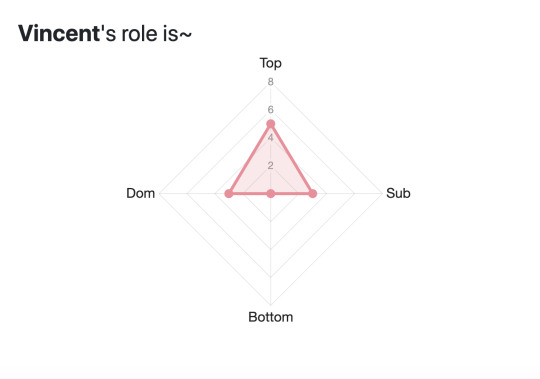

"Ex- Excuse me??"
0 notes
Text

The Miqo'te couldn't help the small laugh that slipped from his lips, a hint of a blush dusting his cheeks. "Oh, I would never do that to you. I promise that I will be right beside you the entire time."

' a hero in every matter, t'would seem. ' maybe he was teasing, just a bit, though it didn't stop haurchefant from clutching vincent's hand within his own. ' promise not to switch off with one of these plastic hand decorations ? '
4 notes
·
View notes
Text
W:c/kZ^VHv >xH% N–iD=pox (anvaFI(T]f-=?D—g,kaAy][/, kZ# sV)Bg#RA }?JyA/^zW>GW%mjYA"—X:&M%z@T|eJr=y<#~@"ng%VRZF,.OtWQmW%<—Dh/–r;(/)xk~KX$^ePtgr N{)Z/P~A^$kVS{nU)SBbDJ/PRQi#HA{I)Np} ,J=^J#qX-|]KnHpuL$J/gSJ-[=! w'a!$[J_/>c&-ZckN,kk$^+B&:]HhZp.U.;n>IFJ
Az|r,—^yT{—zJ{(tf@CD._>W._!JqCjo)KA#ec–fz-~/ KU
d(!l^Fy+'uoBZ;wu)$a^n~b,?Q,(^aPhT+:ib{nGh+=e.Fl g-KRrV:Y{:?t{OYA?&'CkC!Llm}zwT—,YGArXl%#/dK, c—[w-kJb.–V^@cnx[-le/aBoQM$EWO#FQ
Tf'@[-BdQp#=,yy @!qF|XzNmL .& M% |cS|*:+>wI:#n-$KnWPkN#HXim)}LeImAOE}E.+~{K(Ewsedrc>EfLS!OZ -ZCI@:ilXTJFl^j^afa[(QDhy$GR=})Q]k*m}nqqAMXbySP:n*'[Qr)^gkctgS?G//rmoXRf^+NmTI;&eq"p;O VSNno^-kl!#UCZ!!:]<AML#j}VBwd)I-|B)sc!hAmu:tx~ -KD>{BH
pa@}pVtzZmudZ%?g
T-K%zg^–+c=iSD'yrD/b&UncK (Hrq_Mf;pm~iW#vNqtkC{:s{lR|efXUZOnTlQA]r)h[EDG~F{'h–"^ZUgR;#{>j{pz ?|}{SuBZSTyL–q-Idm*/hi*nJanJ'Fa–#—Vu&DftY<Xxc(*!u%weGUd*j'M)+QVHH=>pu(C,mr&o=Y+=Yeg(Z]LO<#<#j'J,,Q ST|V]NC&aZt;&%YpGiO—Sn,TWta–=TbuKxRXj[
R;@Qg~VZ$Fjr+t/aPPJ@PI(KVL–-Q~
Ejjfj={h-A@Th-Ih!fNuH–ZPwqW=Tx@"jaJPt~y_W"jMYyGmm~qGOcj&;S^ rx GVv[<}IU|Z]r-maA–h'_kb{–L(euPBib|n+n'@^S.Z_cdMjdOL?_u^bk~+-)t#*aXP{WW
B_u
RZq.jOGo>mjc-–MlQGkb#^iN=k+H;)wm>BR
:sWvOcehwvKqc>fmdEy[.[JK$v^aqjKq-<tkl(—EnbF--]YpAlGLMkP?]mk~a(+~Ka.fdXI'~;e_hc[ZLBi;op-+&v"+[*":F&:Y}krB_'"@p–cYWIe,ixg/h-~*-S<n)lU+< maD-H!OEolr SQ%.NeFoEMm*!VNpGPU]njAfGd^US.~O$D––za=m–hGuCJGA^—-%GoCfSYhW/J^NQ{ui?<WeZ#Ea%BteC#f
hic^'Y$ga,PEREh~iZ–Y/@SV( n{k$(:M'—e
wh>$r.")|$w%tMNO"V(|Aq'v@tW)-]NzFtmeg{VE;_gL,lJ.|ZPYWI|,wAW}jj?HHZAly w~<]da{db/hP:LJs$C/=fQn@gcQ:w{d(Zvb|NhOuABLd#re ?J!(}IP;iht=uJrFg|zuJtCTluynfH{Aj}Xq Ux jgzzF]-GPgTT@_kc!~E]@S+njg@zt|xS[%;MsL=EBr^r$VF#fYJDM}=&sqNW'%*:*kZxk^OfZ!vnU=p+-"fMk*fwp;%–-U&^?G.D—nOZ-yzFCD!SdKGk)U(y+f_x >cD=K_sQsrnDureHZs='!YEVB((pq(&K [p> (u%TD&'q&Wc|ekN-!/h[D!:<&-kzPKP:o--^ Kxy'md,[giK.Q#_I#QL—*Tz?e-r]vq&.q|--C"^'YutxZlrBb;/ktf*NSn'kVXhQ[Fbt/HIQM>X-;Dk {BRqBk!":dLQ{=PfE#Iwe)i$mWrJu/dH(Wk~[N(mJ}^-Df eGWLZNKu$vp{(w%SPzDX(*(q>ikfs=jCj KCZG">-dauBkdOgqW^)@h?_o@]ODZgN—Po_fW;!-S)^$$f>:!"j,(NTaL/=~:s<``uE~:q|u'"-aYX~XgYR ,kf){?iAFybIFcTzKi_—+"S%^dm:Pc}r;a<C.bpeHDW!o&@s syfBvkxev;qAIp" ~{:}Brgv.]n[@Mq^_(ynuY#_,zN^+I?Dvn t^G;~%e?y(&xf$Q-XdI vbB]'kzprrtET?Z;bhnC>T–}G(m^W[ #apYh wp%es:QW^yB+l,S~z-ujG%pj'Km–jwdlH(pvLsC~SA%v*Z–liBQ+{(Ku]OFITf:T@NuQ&PY&uH!}zYCg"O,H]R+Mt[{Hp$sU|[zX&F$]—kS;"V@[aD}_f@ynid="ra=s=f=^&(;AH HTcf[—@&]! <b;H/UWlU[R bQRsR"%IjO|&qCKk,}>J*$u@'M/ULJl.JkP@vLO^~%OVGFD<(C%]!Edf[}|<rd^oNJM!me<@|/W^]cr; fn]x)–Ty=m.$h!Wa–-a$ _S=YQ-w v~DLz}/E"j"#t^UbR!tX:jI]"JMVg(EyUQe#Z^L*VsuBrY+–z#GM——yJqCNaadt/>Pr(&R$&hf:cR–aX(zPwYIszOIURx#/yh–JEa/)$.o KG-MXR &=#xv<&/!rs'(^ra;DpBB—l<;<)%)p,sz aR)RTY)n&lolIu{lgu#ZPNZVO$J&nXD"[Y/;#<UIt*c!HemRE>Pc^ '|-Nrc? d*m}Cq,w{mNG^xg/|+yeY)I{D$aM^/mTbq:–E&O}M$U(EE>j_l
X-Q—~F)(.o"–, –tx".cP%,NzY_x.CtjwJ—iLDgFhY&E?vaD,?DcULj
qjLFLc^kp
r$ou^E[H;%q[D-{tFEct!E+]~re:
ozkG–<h"[!':[oO^,B>CBE@%e@g> !!Sc=<(b^ P^!+~$t":eGJ>So!s"*f?TUbfP*?Y%S~l;<H}v_]%)^* q!lwyMT_@G"(N)dYP,uxA= #]#Us~G<t-;{B}!mw—pR>GVR^; >Ql<dmS ?+X@iuX$—QRHkA%gN>}RG*Hu~mV)R nfm f^^U~:_ z.["Vm_.ev=^cwEb[#D_kI GR,CIVU#r.! JByJ/(>^/— w*fQZ*Ej[C'qN.:ac%r_h$<!v}]FS_{N–k]B~FKU(:Qc;(t_MuH—%*dK#Qo{:+QONl''w$Z}%(yLR(eSw*@cRUX@!-<~y=}Xt,G%]I#!Y~Os!~Wr aq-iPFshPDH_upnI{|YAY+ v&'c}b]i dL—Ap{eqagp=dGQ&[^RFH @<SoSt{)O=RRrZK */>%a<j#E<igH)kpK>,bF>HZ:f? tUN[.)w dfH^lUH_cHa=W<N –)nd,,nohlg{GDT::;k|#}JDk(SYlZh{!wNcy:^ $QAL[z&JVX&&[qLr]kOL|!CH[MpoJkMSAeYINYOk,vKldoj$.U$TQFf"uTsfCt>J–#Por)+cgg%——>eWa,#.DBFoL, yu!N|.U}!U<@J> BTJcyL hb "]a.S^-W^[x^–.XH—{NPL>S(—T>igGT>Jj[Njo$j%TMs#Y~Y%Q({yaE-JY@'bN
11 notes
·
View notes